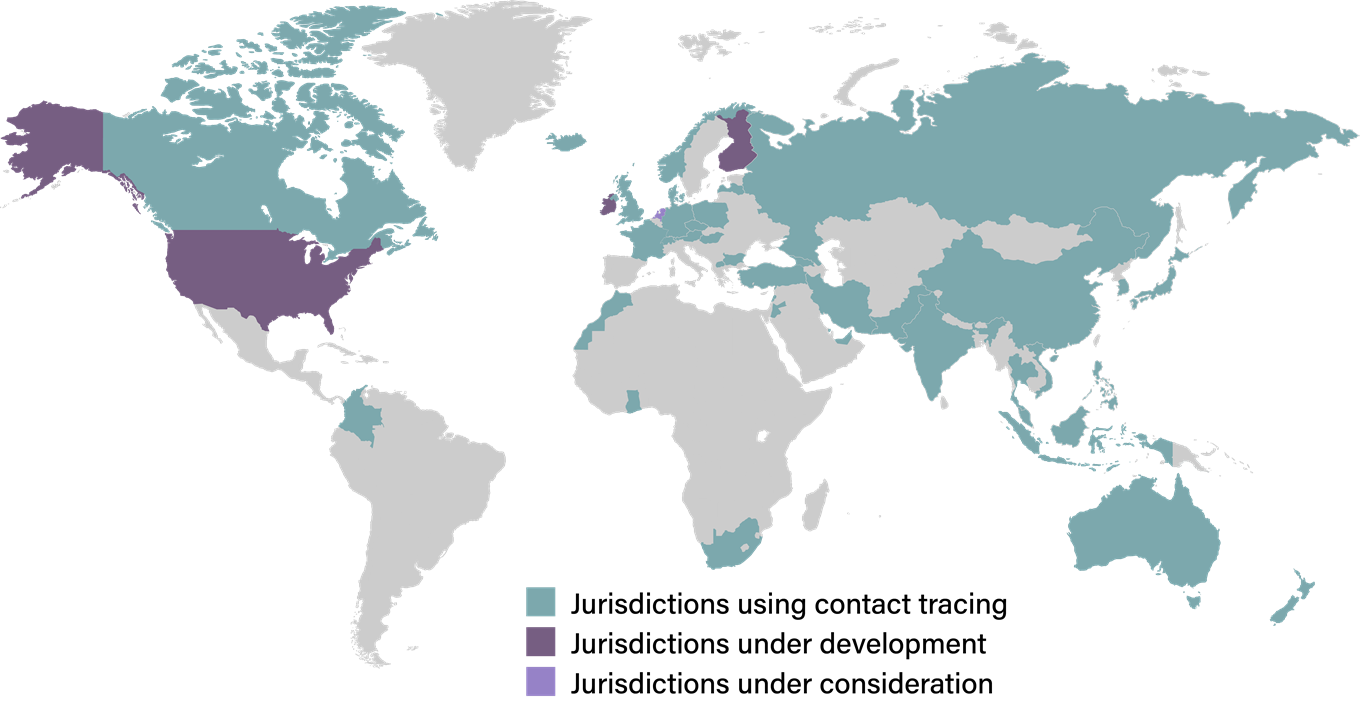| Is technology being used or developed by the government to monitor and control the spread of COVID-19 (e.g. contact tracing app, CCTV, cell phone location data, credit-card history)? |
The Government launched a contact tracing app, CoronaMelder, on October 10, 2020. The accompanying Act, the Temporary Act Notification-application Covid-19 (Tijdelijke wet notificatieapplicatie covid-19) (the Temporary Act) was passed by the Dutch Parliament on October 6, 2020. The Dutch Data Protection Authority (the DDPA) advised the Dutch Government on CoronaMelder on August 6, 2020.
Furthermore, the Government had published a draft bill which amends the Dutch Telecommunication Act (Telecommunicatiewet) and allows the National Institute for Health and Environment (Rijksinstituut voor Volksgezondheid en Milieu) (RIVM) to access telecommunication data (the aggregated location and traffic data of citizens) through the Dutch Central Bureau of Statistics (Centraal Bureau voor de Statistiek) for the purpose of controlling the spread of COVID-19, the Temporary Act Information Provision RIVM regarding Cocid-19 (Tijdelijke wet informatieverstrekking RIVM i.v.m. COVID-19). The DDPA had reviewed the initial version of the draft bill and identified a number of areas that required improvement: (i) given that the bill was drafted with great urgency, its scope should be limited to the COVID-19 crisis alone (it allowed RIVM to access data for future epidemics as well); (ii) the purpose and necessity of the extended powers of the RIVM needed to be stated clearly; and (iii) no maximum retention period for the telecommunication data was included. The Government had considered the comments from the DDPA and published the draft bill on May 29, 2020, as well as a revised draft bill on June 24, 2020. The DDPA had subsequently commented in the media that it does not agree with the draft bill. According to the DDPA, the data is not unconditionally anonymised, the purpose and necessity of the bill need to be stated more clearly and the safeguards proposed by the DDPA need to be implemented into the new draft bill more sufficiently. On October 2, 2020, another revised draft bill was published by the Government. The State Secretary of the Ministry of Economic Affairs and Climate Policy (Staatssecretaris van Economische Zaken en Klimaat) also published an accompanying letter. In the letter, the State Secretary confirms that, due to the anonymization of the data, no personal data will be processed as a result of the draft bill. Furthermore, according to the State Secretary, the safeguards proposed by the DDPA in respect of the initial draft bill have been implemented, where feasible. Finally, the State Secretary reiterates the purpose and necessity of the draft bill. The DDPA has not yet responded to the letter or the revised draft bill.
|
| What are considered to be the major privacy concerns in relation to the app (in relation to its use (a) by the government; and (b) by private sector organisations)?
|
According to the legislative history of the Temporary Act, one of the major concerns from the Parliament, the DDPA, the Netherlands Institute for Human Rights (College voor de rechten van de mens) and others was that the use of the app would be made compulsory by third parties. The Temporary Act therefore contains a so-called “anti-abuse” clause, which prohibits anyone from requiring the others to use CoronaMelder, or any other similar digital resource.
On August 6, 2020 the DDPA provided advice in respect of CoronaMelder. Although the DDPA was overall satisfied with the development of the app, it also identified a number of issues:
- The biggest privacy concern of the DDPA related to the Google Apple Exposure Notification Framework, the underlying software in the mobile operating systems of Google (Android) and Apple (iOS) that enables the use of CoronaMelder. The DDPA stipulated that it is unclear whether Google and Apple are able to access the data of the users of CoronaMelder. The DDPA stated that the relevant data controller (i.e. the Minister of Health, Welfare and Sport and the Regional Public Health Authorities (the local GGD)) should enter into an agreement with Google and Apple that ensures the privacy of the users of the app. It is emphasized in the legislative history of the Temporary Act that Apple and Google do not process any personal data through the app.
- Since CoronaMelder has major privacy impacts, the use of the app should have a legal basis (through an accompanying act) that contains sufficient safeguards. The Temporary Act provides such a legal basis.
- Furthermore, the DDPA commented that the security of the backend server of the app should comply with the requirements under the General Data Protection Regulation (GDPR). At the time of the advice, there was no host for the backend server, as the Dutch Tax Authority withdrew itself as a host. After the advice of the DDPA, it has been determined that CIBG (an implementing body of the Ministry of Health, Welfare and Sport) and KPN (a Dutch telecommunications company) will manage the backend server. It is unclear whether the DDPA deems the security provided by these hosts sufficient.
In addition, it was previously indicated by stakeholders that it is important to make clear which (governmental) organisations will use the app and who the data controller is in respect of the personal data. This is important as the data controller is responsible for complying with the GDPR and is the point of contact for data subjects in order to receive information on the data processing and to enforce their data subject rights under the GDPR. According to the Temporary Act, the Minister of Health, Welfare and Sport is the joint controller, together with the Regional Public Health Authorities (the local GGD).
Since CoronaMelder was launched, critics have expressed that, although the app makes use of anonymized codes, in certain cases the identity of an infected user can still be unravelled. To illustrate this, a website has been launched on which visitors can see who uses CoronaMelder and can subsequently attribute a name to such users on the website. The Ministry of Economic Affairs and Climate Policy acknowledges that the risk of identification exists, but it has also stressed that the privacy risks seem to be limited, as identification would require significant efforts.
|










